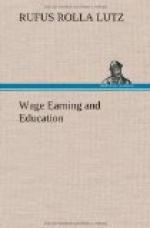Various changes are recommended in the present evening school classes for machinists, molders, and pattern makers now given by the technical high schools. It is claimed that the courses as now organized are not elastic enough to meet the varying needs of the journeymen, helpers, machine operators, and apprentices employed in these trades. The great need is for short unit courses in which the instruction is limited to a particular machine or a special branch of the trade. The long course tends to discourage the student, especially when it embraces an amount of theory out of all proportion to his working needs.
AUTOMOBILE MANUFACTURING
Due to the large number and specialized character of the occupations in this industry, they are taken up in a more general way than the “foundries and machine shop” group. The productive departments of the automobile factories utilize in the main the same equipment as other machinery manufacturing plants, but specialization has been carried to a degree found in few other metal industries. The “all-round” workman is a rara avis. The machine shops are manned by machine “specialists” most of whom know how to operate a single machine tool or perform a single operation made up of relatively simple elements. From one-half to two-thirds of the working force is recruited from immigrant labor which is “broken in” under skilful foremen within a period varying from a few days to a few weeks. In the simpler assembling operations the jobs are so subdivided that any man who is not actually feebleminded can learn the work in a few days. Production is on a large scale, permitting the maintenance of high-grade engineering and experimental departments, where all of the work is planned to the last detail. As a result the automobile manufacturers are turning out one of the most complicated and most efficient machines known to modern industry with a working force composed chiefly of semi-skilled labor.
For the machine shop workers the training suggested is similar to that recommended for the same class of workmen in other machine shops. The necessity of short unit courses adapted for teaching parts of the trade rather than the whole trade is obvious, as most automobile workers are employed on specialized operations. Short unit evening courses for motor and transmission assemblers, and testers and inspectors, are recommended.
STEEL WORKS, ROLLING MILLS, AND RELATED INDUSTRIES
A somewhat similar treatment is followed with respect to the iron and steel group of industries—blast furnaces, steel mills, rolling mills, wire mills, nail mills, and bolt, nut, and rivet factories. These industries are characterized by a high proportion of common and semi-skilled labor in the working force. Between 75 and 90 per cent of the workers are of foreign birth. In the operating department of one mill only two Americans were found among a total of 600 employees. As a rule the native born workers are mechanics employed in the power and maintenance departments.




